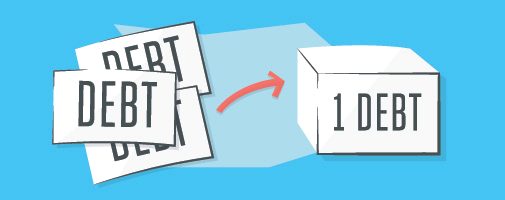Consider debt consoidation the last measure before bankruptcy, liens, wage garnishing, and even foreclosures — all of which put black marks on your credit reports for at least seven years.
Why is there potential for the black marks to last longer than seven years?
Interest and penalties can still accumulate even after repayments have been arranged and communicated to the credit agencies. The date of the last interest or penalty assessment becomes the starting point from which the seven-year horizon begins.
So if you literally have no other way of keeping these black marks off your credit reports, then it might make sense to consider debt cxonsolidation.
What Happens When You Consolidate Your Debts?
Debt consolidation is essentially a type of refinancing, only it takes multiple debts and turns them into a single loan.While it might look like a sweet deal at first, ultimately you end up repaying more than you would if you went another route.
Consolidation loans typically have higher interest rates and last longer than the original debt. While your indebtedness grows, your credit store drops; the further it goes down, the more expensive it gets for you to refinance anything.
Sadly, indebtedness often continues to pile up even after a consolidation loan begins if the borrower doesn’t change their behavior.
Refis Versus Programs
Herein lies a key difference between the program approach to debt consolidation and offerings that are strictly refinancings. Debt consolidation programs include coaching on budgeting and learning how to live within one’s means while making repayments.
Merely refinancing into a single loan without changing financial behavior might only postpone the inevitable — foreclosures, liens, wage garnishing andbankruptcy.
However, the coaching part of the consolidation programs gets priced into the interest rates and loan maturities on the associated refi loans. If you can find a way to teach yourself these same skills and discipline yourself to use them, you can save additional money on debt repayments.
Debt Repayment 101
The debt repayment coaches typically teach borrowers to:
- Pay closer attention to all of their financial accounts and statements
- Write down all of their expenses and income to create a budget
- Find ways to increase income and reduce expenses
- Commit to not taking on any new debt
Practicing these skills might be tough at first but with practice they can become second nature.
Readers, have you mulled whether to consolidate your debt?
Jackie Cohen is an award winning financial journalist turned turned financial advisor obsessed with climate change risk, data and business. Jackie holds a B.A. Degree from Macalester College and an M.A. in English from Claremont Graduate University.


